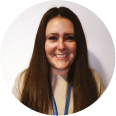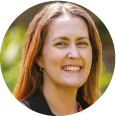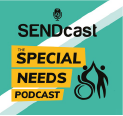
Online conference: 10th March
TICKET: £80+VAT gives entry to all sessions and on-demand access for one month.
Live Q&A with our expert speakers
10th March 09:00

Kate Freeman, Consultant – Speech and Language in Education
I am very excited to be, once again, hosting The Link Live 2023.
This year our focus will be on Supporting SLCN Together and we have a great line up to look forward to.
The day begins with a keynote speech from Professor Courtenay Norbury. She will talk about the impact of Developmental Language Disorder (DLD) on education and life outcomes – a topic which many of us already have some experience of.
Speaking of personal experience, we are also excited to welcome Mushy Asghar, from Channel 4’s Educating Yorkshire programme. Mushy is now a speaker and journalist and will be telling his story of stammering and describing how teachers can make a difference to students like him.
We will also have practical input from Sidonie Delaney SaLT; OT Kim Griffin; and Georgina Durrant, former SENCo, author and founder of SEN Resources Blog, who will look at using play to promote language. Additional presentations focus on the difference between reading and speaking, and also DLD and vocabulary.
There will be plenty of opportunity to post questions in the live chat, so that the presenters can answer as if you were in the room with them.
Can you afford to miss this?
I look forward to seeing you there.
10th March 09:10

Keynote Speaker: Professor Courtenay Norbury, Professor at UCL and Principal Investigator of SCALES, a longitudinal study of children’s language and cognitive, social and academic development.
Words for Well-being: why language matters for mental health
Professor Norbury will present data from a 10-year longitudinal study of language development and disorder in over 500 children from school entry through the transition to secondary school. Professor Norbury will focus on potential mechanisms explaining the well-established link between language disorder and adverse social, emotional, and behavioural outcome. The data show that early language is predictive of later skill in emotion recognition and emotion regulation. These skills in turn associate with parent ratings of anxiety and depression. However, the relationships are complex and further complicated by limitations in assessment.
These findings have profound implications for young people with language disorder and their ability to access ‘talking therapies’ and the verbal strategies we rely on to promote good mental health.
Learning objectives for delegates:
Describe how different aspects of language may support social-emotional development
Outline evidence that children with language disorders are at increased risk for poor mental health, but underserved by current services
List ways in which clinicians, teachers and families may support language for well-being
Explain why diagnosis of language disorder may be useful for young people and their families
Twitter: @lilacCourt
10th March 10:00

Georgina Durrant, Former teacher/SENDCO and author of “100 Ways Your Child Can Learn Through Play”
How can play help to develop speech, language and communication skills?
Georgina Durrant aims to answer this question in her presentation and equip you with fun, practical activities that you can use to help develop children’s speech, language and communication skills in your school or setting. Play-based activities can be fantastic opportunities to weave in speech, language and communication skills and Georgina will show you some really enjoyable activities that will get children communicating whilst doing what children do best…having fun! All of the activities are easy and cheap to resource, and they can be tweaked to match the children in your class/setting’s interests.
Twitter: @senresourceblog
10th March 11:00

Katie Kerslake, Specialist speech and language therapist and clinical lead for speech in Kent Community Health NHS Foundation Trust since 2015.
Why do speech sound difficulties affect literacy development?
I graduated from Birmingham City University and have worked as a paediatric speech and language therapist within KCHFT since 2009. I have worked within the early years’ clinic service, within mainstream schools and was the Early Years Team Lead until 2019.
My presentation will provide delegates with a sound understanding of how literacy and speech sounds are linked and how they can best support the development of these pupils’ literacy skills.
Twitter: @ChildTherapyEK
10th March 12:00

Kim Griffin, Occupational Therapist
BACK BY POPULAR DEMAND
Kim Griffin, occupational therapist and founder of GriffinOT will deliver a colourful and practical presentation for practitioners supporting children who have sensory processing differences and/or motor skill challenges.
Kim looks forward to taking questions from the delegates and discussing strategies and ideas in what aims to be a lively, interactive and practical session.
10th March 14:00

Sue Marr, Specialist teacher, Moor House Institute
Developmental Language Disorder & literacy difficulties – the overlap
Literacy underpins most things you do in class, but language underpins everything. A child with Developmental Language Disorder (DLD) will have significant, ongoing difficulties using and/or understanding language which impacts on speaking and listening, reading, and writing.
In her presentation, Sue, will briefly explain what DLD is and discuss why children with DLD struggle with literacy. Sue will explore the relationship between DLD and Dyslexia; the similarities and differences between these two common childhood disorders and where the overlap occurs.
She will also share some practical activities and approaches to support the development of literacy skills for children with DLD, with a particular focus on reading comprehension.
Learning outcomes for delegates:
Understand the key areas of language comprehension that children with Developmental Language Disorder struggle with and how these impact on their literacy skills
Recognise the overlap between Developmental Language Disorder and Dyslexia
Know some key activities and strategies to support the acquisition of literacy skills for children with DLD
Twitter: @MHResTrain
10th March 15:00

Musharaf (Mushy) Asghar, Speaker and journalist
Finding my voice
My name is Musharaf Asghar, better known to many as Mushy. I am 24 years old, the youngest of five siblings, and I’m a keynote speaker with a stammer. Since my story was first told on Channel 4’s documentary series Educating Yorkshire, I have devoted my years to spreading awareness about stammering and motivating those who feel life has set them back to be resilient in the wake of their vulnerability.
My presentation will describe the impact teachers and educators can have on a young person. I will explore in detail how our ‘voice’ is such a crucial element in developing relationships and how we can support students who feel absent from the class. Furthermore, I’m hoping listeners will walk away with crucial tools they can immediately start using in their classrooms.
Twitter: @MusharafAsghar
10th March 16:00

Sidonie Delaney, Speech and Language Therapist
How to support pupils with severe speech sound difficulties within the school setting
My name is Sidonie Delaney, and I run Speech4Schools and Speech4Kids providing support for schools with their SLCN caseload and also independent therapy for children in our two clinic settings. I love lots of aspects of my job, but my favourite client group is definitely those with really severe speech sound difficulties.
My talk is going to be all about how to support these pupils with severe speech sound difficulties within the school setting. We have all been there; when a child in your class chats away to you and you really haven’t got a clue what they have said. It must be so frustrating for them and it’s immensely awkward for the adult too. How can you build a rapport with them? Do you stop asking them questions in fear that you won’t be able to decipher their response?
My talk is going to be a relaxed, informal chat about where to start with these really tricky cases. I want the listeners to go away with lots of new ideas on how they can practically help, feel really enthused to give it a go and make the world of difference for that child. I will have loads of resources to hand that I hope will inspire you so you feel energised to help crack those speech sound difficulties!
There will also be a chance to ask questions at the end about a pupil’s intervention that has gone a bit stale, or that you have just hit a brick wall with your approach!
Twitter: @Speech4Schools
Meet our sponsors

Axcis is the leading supplier of special educational needs and disabilities (SEND) staff in England and Wales. We recruit special educational needs and disabilities (SEND) staff for mainstream schools and alternative provisions across England and Wales and offer recruitment solutions for short-term, long-term and permanent vacancies. Working with the broadest range of positions, our candidates include teachers, teaching assistants, therapists and school leaders.
Get in touch at: www.axcis.co.uk/contact/

The SENDcast is a weekly podcast helping and supporting SENCOs, teachers and anyone working or living with children and young adults with SEND. With over 100 episodes and 100,000 downloads, it is the number 1 special educational needs podcast. You can listen for free on your favourite platform.
Tickets: speechandlanguage.info/linklive
Please login to view this content
Login